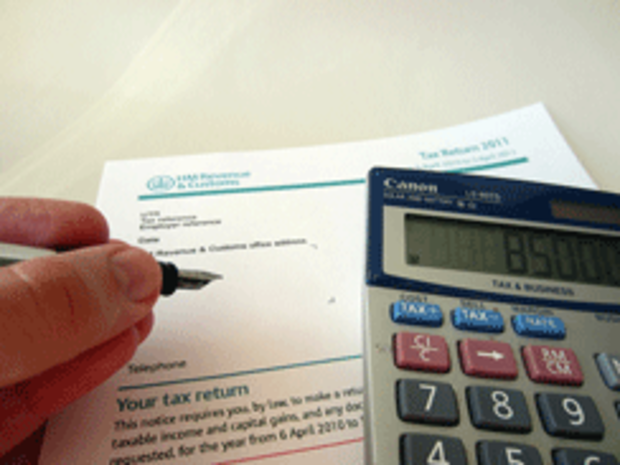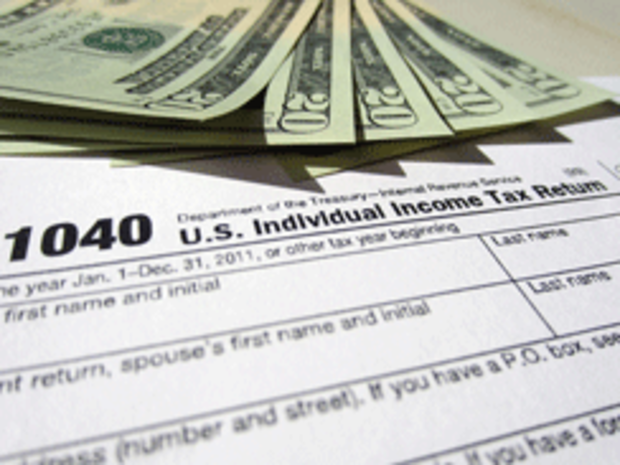What every investor should know about taxes
(MoneyWatch) Of the 77 investing errors I cover in my latest book, "Investment Mistakes Even Smart Investors Make," four of them relate to taxes. And since it's tax season, it's a good time to provide a brief overview of those mistakes.
5 tax errors to avoid
5 things that trigger an IRS audit
A tax tip for boosting your retirement income
Photo courtesy of Flickr user 401K
What every investor should know about taxes
Do you focus on pretax returns?
Ted Aronson's investment firm, Aronson Johnson Ortiz, manages more than $20 billion. Yet Aronson told Barron's in 1998 that: "None of my clients are taxable. Because, once you introduce taxes... active management probably has an insurmountable hurdle. We have been asked to run taxable money -- and declined. The costs of our active strategies are high enough without paying Uncle Sam."
Despite the fact that taxes are probably the largest expense taxable investors incur, even greater than management fees or commissions, many investors focus only on pretax returns. You shouldn't make this mistake, especially when there are readily available alternatives that are superior to actively managed funds.
In fact, an increasing focus on after-tax returns is one of the driving forces behind the rapid growth of ETFs -- their structure can make them more tax-efficient than indexed mutual funds. In addition, providers of index and passively managed funds have taken the issue of tax management to the next level by creating funds that specifically focus on generating higher after-tax returns (even if that means lower pretax returns). Tax-managed funds strive both to minimize fund distributions and to maximize the percentage of distributions that will be in the form of long-term capital gains. They accomplish this by implementing the following strategies:
- Lowering turnover by widening the definitions of their buy and hold ranges
- Avoiding intentionally taking short-term gains
- Harvesting losses by selling stocks that are below cost, in order to offset realized gains in other securities
- Selling the appreciated shares with the highest cost basis
- Trading around dividend dates
- Ensuring that revenue from securities lending doesn't exceed the operating expenses of the fund
When deciding on the choice of funds for your taxable account, make sure you are taking tax management strategies into account.
Photo courtesy of Flickr user 401K
What every investor should know about taxes
Do you fail to tax manage your portfolio throughout the year?
Do you fail to tax manage your portfolio throughout the year?
You should be employing the exact same strategies that tax-wise mutual funds employ. By mimicking those strategies, in conjunction with other techniques, you can improve your after-tax returns. However, even tax-wise investors tend to focus on taxes just twice a year -- at year-end and around April 15. Focusing on taxes should be a year-round job. After all, harvesting losses is a year-round job.
One reason is that a fund might have a loss that can be harvested during the year, but recover by year-end. In that case, the opportunity to tax-loss harvest would have been lost. In addition, it's typically important to take any short-term losses before they become long term. Short-term losses first offset short-term gains that are otherwise subject to higher ordinary income tax rates, while long-term losses first offset long-term gains that are otherwise subject to lower long-term rates. Investors who harvest losses reset their cost basis to new lower levels. The tax rate differential then provides the opportunity to arbitrage the tax system. (See my book for a more detailed explanation.)
There's another important tax strategy of which you should be aware. If you've held a fund for more than a year, you should always check to see what estimated distributions the fund plans to make during the year -- specifically focusing on the amounts that will be ordinary income, short-term capital gains, and long-term capital gains. Most funds make distributions once a year, usually near the end of the year; but some make them more frequently, and sometimes funds make special distributions. You can usually obtain this information from your fund prior to the record date. It's important to see if there are going to be large distributions that will be treated as either ordinary income or short-term gains.
If this is true, then you might benefit from selling the fund before the record date. By doing so, the increase in the net asset value will be treated as long-term capital gains, and taxes will be at the lower long-term rate. If the fund making the large payout is selling for less than your tax basis, you certainly should consider selling the fund prior to the distribution. Otherwise you'll have to pay taxes on the distribution, despite having an unrealized loss on the fund -- a tax hell for an investor if ever there were one.
Just as a tax-managed fund trades around dividend dates (or avoids purchasing a stock about to pay a dividend), it's also important for you to avoid making purchases of mutual funds just prior to the ex-dividend date. You'll be taxed on income you didn't really earn.
Finally, just like tax-managed funds, you should generally avoid intentionally taking any short-term gains. (Simply wait until the long-term holding period is achieved.) For individuals, this last point refers to the rebalancing table that should be part of the investment policy statement. Rebalancing is important, as it allows you to control your portfolio's asset allocation. Without it, market movements will cause style drift.
However, because rebalancing in taxable accounts generally involves paying taxes (since you're selling winners to buy losers), it should be done only when significant style drift has occurred. This is why you should consider using a 5/25 rule to determine when to rebalance, rebalancing only when an asset (or asset class) has drifted either an absolute 5 percent from its target or a relative 25 percent. Either of these two measures can trigger the need to rebalance.
Photo courtesy of taxbrackets.org
What every investor should know about taxes
Do you let taxes dominate your decisions?
Do you let taxes dominate your decisions?
While minimizing the impact of taxes on returns is an important part of a winning strategy, too many investors make the mistake of letting their wish to avoid taxes drive investment decisions, often with disastrous results. The following example will illustrate the point.
It is August 2004, and an investor bought 200 shares of Google (GOOG) at $100. The $20,000 investment amounted to 5 percent of his $400,000 portfolio, half of which was in Treasury bonds. The stock then skyrocketed. By December 2007, Google shares crossed $700. His shares were worth $140,000 and represented almost 25 percent of the investor's portfolio, which had grown to $600,000. In addition, his equity allocation had grown from 50 percent to almost 70 percent.
The investor recognized that his portfolio was considerably riskier both as a result of having as much as one quarter of his portfolio in a single stock and by having a higher allocation to equities. However, selling would result in a large capital gains tax. Assuming a total federal and state tax rate of 20 percent, the tax on his $120,000 gain would be $24,000. Despite the risks, he refused to sell, letting the minimization of taxes drive his decision instead of the management of risk.
Investors who have a low basis in a stock often let the tax situation drive their decisions, forgetting they're taking large risks. They also forget the wisdom in the cliche that the only thing worse than having to pay taxes is not having to pay them. A lesson learned by investors in such great companies as Enron, Bear Stearns, Polaroid, Xerox (XRX) and hundreds of others. For every good (lucky) outcome, we could site dozens of bad ones.
There's a simple way to avoid this mistake -- only two things are required. The first is a written investment policy statement (IPS) with a rebalancing table. The second is the discipline to adhere to the plan. An IPS should have targets and limits on the portfoflio allocation for any one stock or asset class.
Photo courtesy of Flickr user 401K
What every investor should know about taxes
Do you hold assets in the wrong location?
Do you hold assets in the wrong location?
When faced with a choice of locating assets in either taxable or tax-advantaged accounts, taxable investors generally prefer holding stocks (versus bonds) in taxable accounts. There are six advantages:
- Stocks are taxed as capital gains, while bonds (with the exception of municipal bonds) are treated as ordinary income.
- Securities in taxable accounts receive a step-up in basis for the heirs at death, eliminating capital gains (but not the estate tax).
- Capital-gains taxes are due only when realized. That gives investors at least some ability to time the realization of gains.
- When there are losses in taxable accounts, the losses can be "harvested" for tax purposes. The more volatile the asset, the more valuable the option to harvest losses becomes. Stocks are more volatile than bonds.
- Assets held in taxable accounts can be donated to charities. By donating the appreciated shares, capital gains taxes can be avoided. Because stocks have higher expected returns than bonds, this option is more valuable for stocks.
- Foreign stock holdings often entail taxes on dividends being withheld at the source. However, investors may claim a foreign tax credit that can then be used as a credit against U.S. taxes. But this credit does no good unless the asset is held in a taxable account. Although it depends on the individual fund, the loss of the foreign tax credit leads to a reduction of returns of about 9 percent of the dividend amount. It's important to remember that if the investment in international assets is a "fund of funds," any foreign tax credit can't be passed on to the investor by the fund of funds.
The exceptions to the strategy of preferring to hold stocks in taxable accounts and bonds in tax-advantaged accounts include the following.
REITs
Because their dividends are considered non-qualified and taxed at ordinary income tax rates, REITs are a tax-inefficient stock asset class. Since investors can hold tax-efficient municipal bonds, those investors who value the diversification benefits of REITs should locate the REIT holdings in a tax-advantaged account, even before they locate bonds in that account. Again, municipal bonds can be held in taxable accounts.
Commodities
As with REITs, those investors who value the diversification benefits of commodities should locate these assets in tax-advantaged accounts, even if that means having to hold bonds in taxable accounts.
Liquidity needs
Investors with anticipated (or the potential for unanticipated) liquidity/cash-flow needs from their taxable holdings should consider holding some bonds (generally municipal bonds) in their taxable accounts. One widely used rule of thumb is to have six months of spending needs in highly liquid assets of the highest investment grades.
Additional information
- The more tax-efficient funds should be placed in the taxable accounts.
- Tax-managed funds will generally be more tax-efficient than funds that aren't managed for tax efficiency.
- The broader definition of the asset class, the more tax-efficient the fund is likely to be. For example, a total market fund will be more tax efficient than a narrow (e.g., small-cap) asset class fund, and a small-cap fund (that holds both value and growth) will be more tax-efficient than a small-cap value fund.
- Large-cap funds are more tax-efficient than small-cap funds.
- Marketwide and growth funds are more tax-efficient than value funds.
- Multi-asset class funds are more tax efficient than single asset class funds due to lower turnover as stocks migrate from one asset class to another. For example, an international core fund that holds both developed and emerging markets will be more tax-efficient than holding two separate funds. In addition to the reduction in forced turnover, rebalancing costs (between individual asset classes) will be reduced, and the core funds won't have to trade if a country changes classifications from an emerging market to a developed market.
- The more volatile the asset class, the more valuable the tax option. Thus, all else being equal, the more volatile asset classes (e.g., emerging markets) should be held in taxable accounts.




